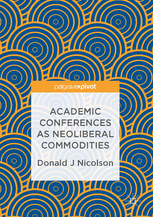Academic conferences as neoliberal commodities (book review)

Donald J. Nicolson’s Academic Conferences as Neoliberal Commodities is a short new book that addresses one of the favorite academic products researchers love to hate. Nicolson’s book offers a fresh and concise overview over the topic based on his own experiences primarily in the field of health science and additional interviews with a sample of academics from different disciplines. His “ exploratory examination ” (p.8) is structured along a fictitious conference proceedings table of content and in many ways he does take us on a journey to explore gatherings of academics in the neoliberal age. He starts with a short historical exploration into conferences and, at least for me, with a reminder that there really was a time when they fulfilled the expectation of “ intellectual communication (and) to enable people to present and discuss findings from research ” (p.5). Nicolson introduces his neoliberal framework early on, but for me it remains somewhat abstract throughout the book, but